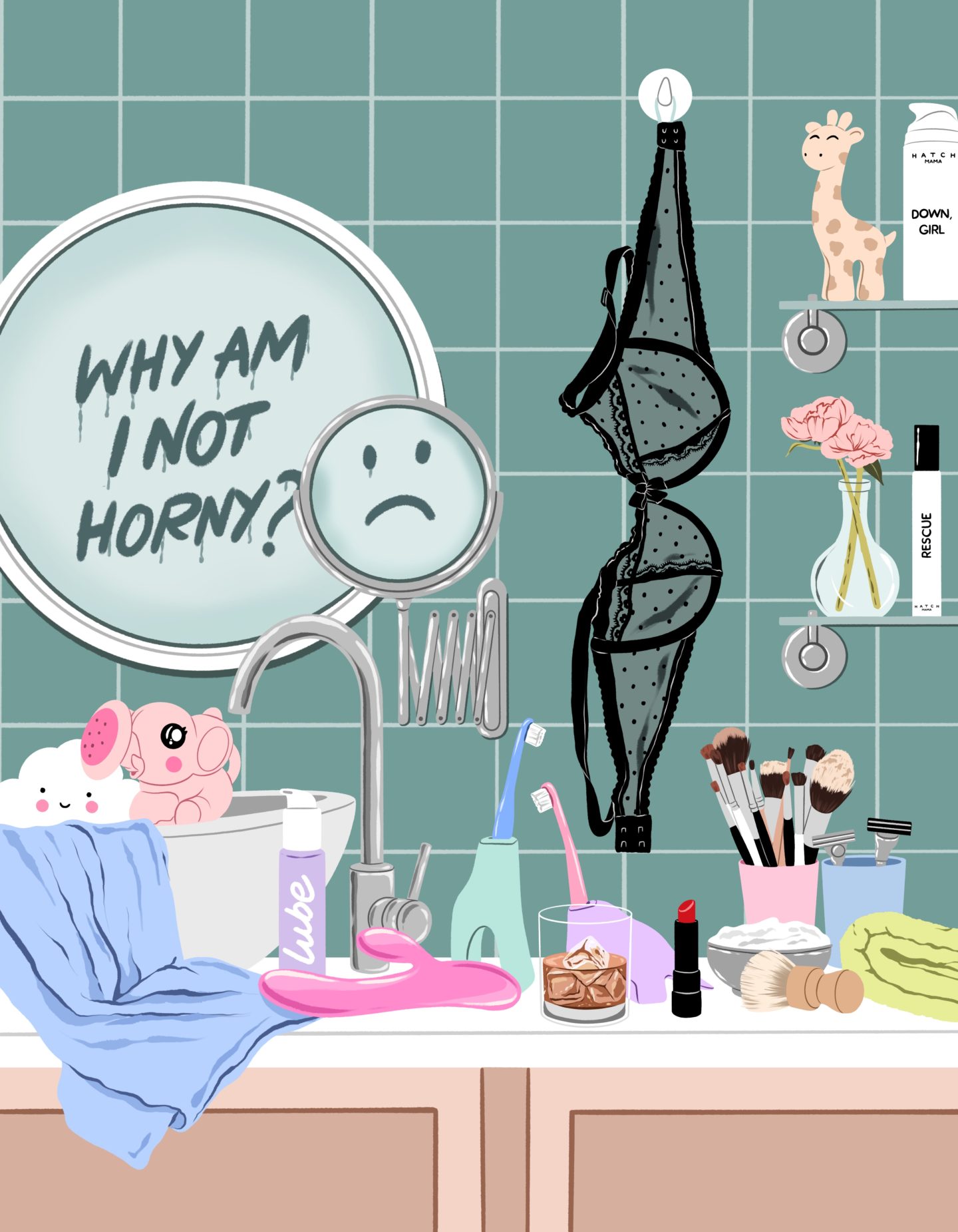Foria was founded with a mission to bring more pleasure to more people with all-natural and organic formulas for your most intimate needs.
Close your eyes for a moment, and think about what desire looks like. For many of us, our sexual vocabulary may owe a lot to movies, music, art, and cultural messaging – steamy images of being overcome with lust out of nowhere, frantic to get down to it, right now.
And sometimes it happens that way, certainly. It’s great when it does. But many of us need more to get in the mood, especially with a new baby in the mix.
Postpartum sex is complicated. Even after your body has recovered from the birthing process and your healthcare practitioners have given you the go-ahead to “resume normal relations”, you have changed on a fundamental level – and not only because of hormonal fluctuations, though they’re very important too.
And the new you, who’s in charge of a whole new human being and also still wants to feel like your lusty, authentic self, may need to approach sex a little differently.
Desire is as individual as our fingerprints, and learning our own sexual patterns can be a lifelong process of discovery. However, it’s possible to simplify matters a bit – and unlock the secrets of our own turn-ons.
For you and your partner, the post-baby sexual landscape may turn out to be a wonderful opportunity to uncover brand-new, and really hot, ways to connect.
Here at Foria, uncovering brand-new, really hot ways to connect – naturally – is our joy and mission. We know that true pleasure is within you, just waiting to be discovered.
Spontaneous vs responsive desire: what’s the difference?
Desire generally comes in two forms: spontaneous desire, like the cinematic image of a lustful couple tearing each other’s clothes off, and responsive desire, which doesn’t have such an aggressive PR department – but for many of us, it’s essential to our pleasure, fulfillment, and sexual self-expression.
For pretty much everyone who experiences sexual cravings, there are two components to our interest: the mental and the physical.
When we’re aroused mentally, we want it! We plan, we fantasize, we imagine what we want to do to our partner, and what we want them to do to us. Mental desire comprises our inner porno theater, our vocabulary of lust, the whats, whens, whys, hows, and with whoms. It’s a story we tell ourselves on the way to bed.
On the other hand, physical arousal happens in the body. Our erectile tissue becomes engorged with blood, our nipples get hard, our heart rate increases. Our pupils may dilate, and we might feel flushed.
Though our physical and mental selves aren’t really separate – in a very real sense, we are our bodies – it is possible to define spontaneous and responsive desire by which of those two processes happens first.
If we experience mental arousal first, then physical – that’s spontaneous desire. We start thinking about sex, then we want sex, then our body follows that mental cue.
If we need to experience physical arousal first, before our mental engine starts revving – that’s responsive desire. When we’re stimulated via our senses, our minds follow suit.
Pretty simple, right? So how does this framework apply to sex after baby?
Spontaneous is sexy… but responsive may be even sexier.
If you’re used to “the mood” coming over you, and wanting sex right now, it can be easy to feel like your libido is completely gone in the postpartum period (which can go on for years, let’s be real).
New parents report feeling just exhausted, of course. It’s not just disrupted sleep, hormonal changes, and the stress of keeping a tiny human alive; we also might be completely “touched-out”. Having a little person clinging to you all day long, plus the skin-to-skin contact that’s necessary for bonding, is wonderful – but it has a way of tanking whatever sex drive you may have access to.
But your desire isn’t gone. It’s just hiding in undiscovered corners, and it may need a little careful coaxing to reveal itself.
Maybe you’ve figured out your libido needs some different things than it used to, but you’re up for exploring. The good news is that there is an infinite buffet of options, and you can pick and choose what feels good for you.
Some ideas include letting go of simultaneous, reciprocal pleasure as a goal, and just gifting your partner – or letting go and allowing yourself to receive with no guilt. (Never ever have you ever? Well, will there ever be a better time to try?)
You can craft an agreement with your partner about what feels good if penetration is off the table. That can look like a request for clitoral stimulation, making out, touching each other sensually but not on the genitals. It could also look like an agreement to try very slow and well lubricated penetration with no goal other than to be present for the sensation in the moment.
The pressure to “have sex” can so often get in the way of wanting it, so sharing how you feel is essential, and then sharing some ideas about what would feel good for both you and your partner. It may feel awkward, but as we ALWAYS say, sex with no goal is often the best kind of sex.
Inspiration for post-baby bliss
If you’re finding you need physical support to get in the mental mood, there’s a whole sexy world to explore. Just plan on giving yourself what your body needs first, to bring your mind on board.
Need a little extra help? Foria designed our Awaken Arousal Oil with Organic Botanicals to work with your body and help support that all-important physical desire.
Non-sexual touch. One of the most important ways you can connect with your partner and understand your changing needs is through non-sexual touch. A lot of new parents have the experience of feeling “touched out”, so connecting through loving touch that feels giving and nourishing, instead of touching from a place of serving a sexual need, will go a long way.
This can look like giving or receiving a massage, hugging or cuddling without expectation that it will go any further, and even holding hands. This type of touch should feel comforting to you both, and set your mind and body at ease – without any expectation. This gives your bodies a chance to co-regulate and feel connected, without the added pressure that “things need to go further” – which can make sex start to feel like a chore.
Masturbation. We know it’s hard to come by, but finding some alone time is an essential ingredient. It might sound entirely impossible, but this is not a luxury – it’s actually a necessity.
Self-pleasure is an amazing way to activate your libido, connect with your body, and remember how good it feels to be touched in a sexually intimate way. It’s also a great way to get to know yourself again, giving you time to relearn your own landscape as your body changes and heals after birth.
Don’t feel like masturbating? Consider tapping into responsive desire with visual, mental and/or audio cues. An erotic audiobook, a piece of juicy literature, your favorite sensual movie might get your juices flowing, and invite your partner to join with no pressure.
And speaking of your partner, give them permission to masturbate all they need to. We all have sexual needs, and in general, we should be responsible for meeting our own needs, and then coming to our partner with our desire – not with the expectation that they have to be ready when we are.
That said, the postpartum period is often a very sensitive time to find the space and energy to connect sexually, so giving your partner the space they need to masturbate and explore sexual pleasure with themself is a gift.
Communicating your true needs in the moment. Yes, sometimes it’s capital-A Awkward. But this level of vulnerability will help your partner truly understand what you are going through and what you are available for, and you for them.
Something as simple as “I would love to connect with you but I’m just not feeling up for penetration right now. Would it be ok if we spent the next hour just kissing and touching each other? I feel so good about having your hands on my body.”
Or, “I can imagine it would feel really good for both of us to feel connected intimately right now, but my body just doesn’t feel ready for sexual stimulation yet. Does a long massage sound good to you?”
Stay safe to keep it sexy.
The flipside of a responsive libido is that we may lose all interest in sex, alone or with a partner, when we feel unsafe. Anxiety is a survival mechanism; when we feel anxious, our bodies tend to assume we’re in physical danger – and they’ll tell us it’s not a great time to get down.
And when the body is stressed, in survival mode, or adapting to major changes – which a new baby certainly is! – your body may perform a kind of triage, and eliminate nonessential urges. On a primal level, eschewing sex (and not getting pregnant again too soon) means prioritizing your child’s needs – and yourself.
On top of that, you’re thrust into the brand-new realms of parenthood – which change your daily rhythms entirely and impact all of your eating, sleeping, and survival strategies. You’re left running on fumes of love and oxytocin. To say the least, it is hard.
So perhaps the first step to a fulfilling postpartum sex life is making sure you feel as safe and nourished as possible.
If you’re not supported mentally, emotionally and physically, you might not feel safe or emotionally available enough on a deep level to want to engage in partner sex. Even though sex can be incredibly nourishing, it sometimes can feel like another thing that needs your attention, or it’s just hard to muster the energy.
Being ready to engage intimately with a partner may mean that you need to be supported through sufficient sleep, nourishing foods, having enough time to rest and recover, and as little stress as possible.
And lastly, always remember that desire is unique and personal. Using responsive desire as your guide, you might just discover that your post-baby self loves things you didn’t know you would – and this can give you deep insight into what really turns you on for life. Be curious, be playful, and explore – there are gifts in your new world, just waiting to be found.









